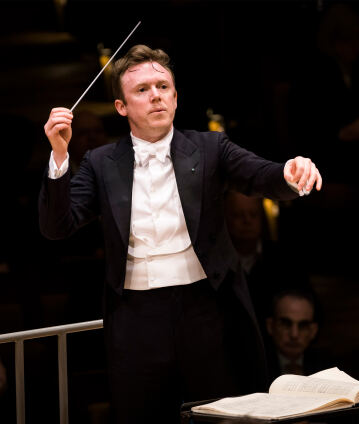Daniel Harding dirige la Primera Sinfonía de Mahler

La música de Gustav Mahler se sitúa en el umbral del modernismo: unas veces escéptica, otras confiada y, a pesar de ocasionales impulsos nostálgicos, siempre es decididamente innovadora. Daniel Harding yuxtapone la Primera Sinfonía de Mahler con obras de Alban Berg y Charles Ives, contemporáneos cuyo lenguaje musical muestra tanto semejanzas como grandes diferencias con respecto a Mahler. Un apasionante viaje de descubrimiento.
Daniel Harding was an assistant to Sir Simon Rattle and Claudio Abbado. He received the Royal Philharmonic Society’s Best Debut Award for his official debut with the City of Birmingham Symphony Orchestra. In 1996, he conducted the Berliner Philharmoniker for the first time as part of the Berliner Festwochen and also made his debut at the BBC Proms in London – as the youngest conductor in the history of this renowned festival. As one of the most successful orchestral conductors of his generation, he is currently music director of the Swedish Radio Symphony Orchestra, and celebrated his tenth anniversary with them in 2017. In 2016, Daniel Harding took over the position of chief conductor of the Orchestre de Paris. He is conductor laureate of the Mahler Chamber Orchestra with whom he has worked together for more than 20 years, and was chief conductor of the Trondheim Symphony Orchestra and the Deutsche Kammerphilharmonie Bremen.
For this guest performance with the Berliner Philharmoniker, Daniel Harding opens the concert with the orchestral suite Three Places in New England. The titles given to the movements by Charles Ives relate to natural settings or scenes from American history: the first movement, for example, The “St Gaudens” in Boston Common, is a memorial dedicated to the American Civil War. The music of the Three Places contains an abundance of allusions to traditional marches and songs that repeatedly intrude into the quiet musical process as if from a spatial and temporal distance.
The programme continues with Alban Berg’s Drei Bruchstücke (aus ‘Wozzeck’) with the soprano Dorothea Röschmann as the soloist. In 1924, at the suggestion of Herrmann Scherchen, Berg extracted parts of his stage work that had already been completed for two years, but which had still not found a conductor brave enough to premiere it. The music, with its shifts between inner psychological drama and expressive outpourings did not fail to have the desired effect: Erich Kleiber was so entranced by the emotional intensity of the fragments that he premiered Wozzeck at the Staatsoper Unter den Linden in Berlin on 14 December 1925.
The main work of the evening is Gustav Mahler’s First Symphony, at the beginning of which the listener is embraced by a musical and spatial depiction of sylvan solitude with the “awakening of nature at the earliest dawn” (Mahler). The rustic scherzo, which Willem Mengelberg simply called a “peasant dance”, is followed by the slow movement with “a soon-to-be ironically funny and sometimes frighteningly brooding mood”, before the finale, which begins “with a horrible outcry” (Mahler), brings about a dramatic conclusion.
© 2019 Berlin Phil Media GmbH
Entrevista del concierto
Artistas
Nuestras recomendaciones
- Daniel Harding dirige «Escenas del Fausto de Goethe» de Schumann
- Daniel Harding dirige la Sexta Sinfonía de Mahler
- Concierto Europa 2019 con Daniel Harding desde el Musée d’Orsay de París
- Daniel Harding dirige Schubert y Strauss
- Daniel Harding dirige la Sinfonía núm. 10 de Mahler
- Daniel Harding y Lisa Batiashvili